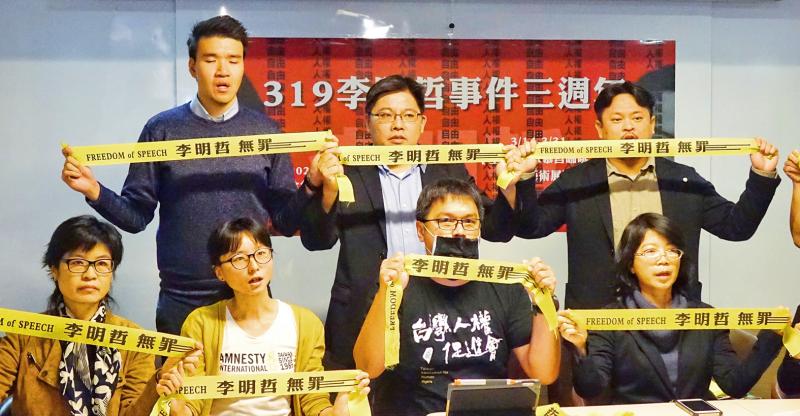Human rights groups and lawmakers yesterday demanded China immediately release imprisoned rights advocate Lee Ming-che (李明哲), as they marked the third anniversary of his detention in Guangdong Province.
Lee, a staff member at Wenshan Community College in Taipei, went missing on March 19, 2017, after entering Zhuhai, Guangdong Province, from Macau. On Nov. 28 that year, the Yueyang City Intermediate People’s Court in Hunan Province sentenced him to five years in Chishan Prison for subversion of state power by using online discussion groups to disseminate information attacking the Chinese government and for supporting the families of Chinese dissidents.
Taiwan has not forgotten Lee, members of the Rescue Lee Ming-che Team told a news conference in Taipei, which included a display about “365 Letters Written to Lee Ming-che” exhibition of letters written by Taiwanese to Lee.

Photo: Liu Hsin-de, Taipei Times
Exhibition curator Wu Ting-chen (吳亭臻) urged the public to write more letters to Lee and urged the Chinese government to release Lee.
Several lectures are to be given in Taiwan over the next two weeks to raise awareness of Lee’s case and human rights, and the letters exhibition is to go on display, Wu said, adding: “The possibility of another Lee Ming-che is always there.”
Amnesty International Taiwan executive director Chiu Ee-ling (邱伊翎) said Lee has not been able to write letters or make telephone calls since his detention, in contravention of the Prison Law of the People’s Republic of China and the UN Standard Minimum Rules for the Treatment of Prisoners.
Covenants Watch chief executive officer Huang Yi-bee (黃怡碧) said her group issued a statement with the Asian Forum for Human Rights and Development, the International Federation for Human Rights, the Taiwan Association for Human Rights demanding China immediately release Lee and stop retaliating against human rights advocates through forced disappearances and arbitrary arrests.
Independent Legislator Freddy Lim (林昶佐) said Lee did not have a fair trial, but given the COVID-19 pandemic, the hygiene and human rights conditions in Chinese prisons are cause for concern.
“Our core belief is that Lee is innocent and should be released. However, given the current circumstances, it is at the very least that his situation in prison should be transparent to his family,” Lim said.
Democratic Progressive Party (DPP) Legislator Hung Shen-han (洪申翰) said Taiwanese efforts to support Lee would not stop until he is released and China’s change in its human rights policies.
DPP Legislator Fan Yun (范雲) said “everybody is Lee Ming-che” if they supported the pro-democratic movement in Hong Kong last year or have criticized Chinese President Xi Jinping (習近平) on the Internet.
After three years, it is time for Lee’s ordeal to end, Fan added.
New Power Party Legislator Chiu Hsien-chih (邱顯智) said Lee’s case was an obvious miscarriage of justice, and that he was concerned about Lee’s well-being, given that Chinese lawyers he worked with say conditions in Chinese prisons are “worrying.”
At a news conference at the Legislative Yuan on Wednesday, Lee’s wife, Lee Ching-yu (李凈瑜), pleaded with the Chinese government to allow her husband to call her.
Her scheduled visit to the prison last month was canceled because of the COVID-19 outbreak and she has not received any information about her husband’s condition since then, she said.
This story has been corrected since it was first published to correct Chiu Ee-ling's title. She is no longer Taiwan Association for Human Rights secretary-general, but the executive director of Amnesty International Taiwan. The Taipei Times regrets the error.

A total lunar eclipse coinciding with the Lantern Festival on March 3 would be Taiwan’s most notable celestial event this year, the Taipei Astronomical Museum said, urging skywatchers not to miss it. There would be four eclipses worldwide this year — two solar eclipses and two lunar eclipses — the museum’s Web site says. Taiwan would be able to observe one of the lunar eclipses in its entirety on March 3. The eclipse would be visible as the moon rises at 5:50pm, already partly shaded by the Earth’s shadow, the museum said. It would peak at about 7:30pm, when the moon would

A New York-based NGO has launched a global initiative to rename the nation’s overseas missions, most of which operate under the name "Taipei," to "Taiwan Representative Office (TRO)," according to a news release. Ming Chiang (江明信), CEO of Hello Taiwan, announced the campaign at a news conference in Berlin on Monday, coinciding with the World Forum held from Monday through Wednesday, the institution stated in the release. Speaking at the event, Democratic Progressive Party Legislator Huang Jie (黃捷) said she believed this renaming campaign would enable the international community to see Taiwan

DEFENSE: The US should cancel the US visas or green cards of relatives of KMT and TPP lawmakers who have been blocking the budget, Grant Newsham said A retired US Marine Corps officer has suggested canceling the US green cards and visas of relatives of opposition Taiwanese lawmakers who have been stalling the review of a proposed NT$1.25 trillion (US$39.7 billion) special defense budget. The Executive Yuan has proposed the budget for major weapons purchases over eight years, from this year to 2033. However, opposition lawmakers have refused to review the proposal, demanding that President William Lai (賴清德) first appear before the Legislative Yuan to answer questions about the proposed budget. On Thursday last week, 37 bipartisan US lawmakers sent a letter to Legislative Speaker Han Kuo-yu (韓國瑜), the heads

TOO DANGEROUS: The families agreed to suspend crewed recovery efforts that could put rescuers in danger from volcanic gases and unstable terrain The bodies of two Taiwanese tourists and a Japanese pilot have been located inside a volcanic crater, Japanese authorities said yesterday, nearly a month after a sightseeing helicopter crashed during a flight over southwestern Japan. Drone footage taken at the site showed three bodies near the wreckage of the aircraft inside a crater on Mount Aso in Kumamoto Prefecture, police and fire officials said. The helicopter went missing on Jan. 20 and was later found on a steep slope inside the Nakadake No. 1 Crater, about 50m below the rim. Authorities said that conditions at the site made survival highly unlikely, and ruled